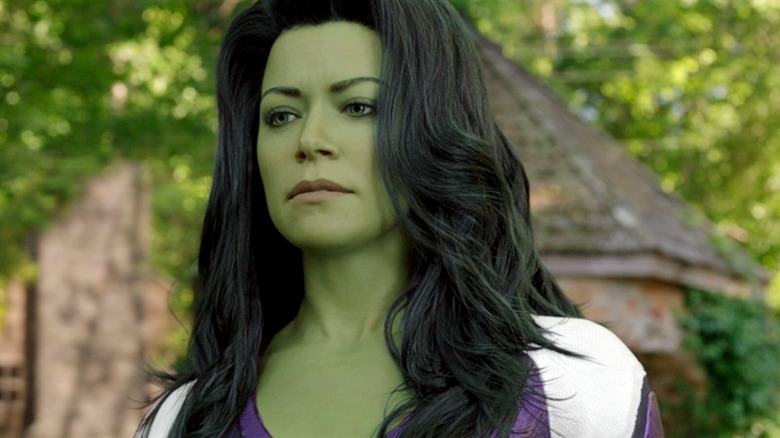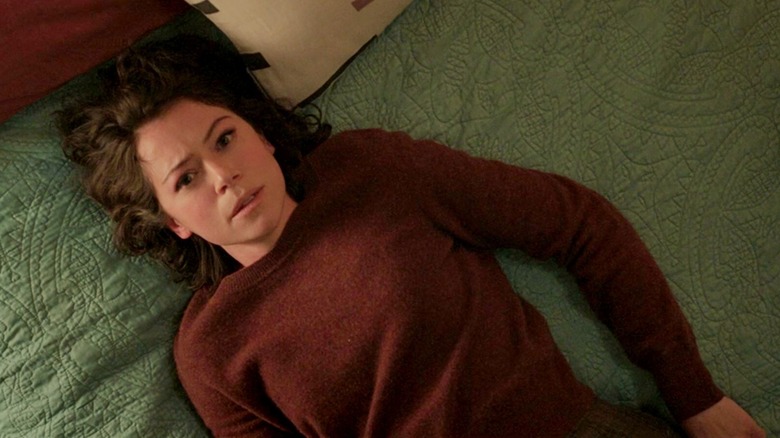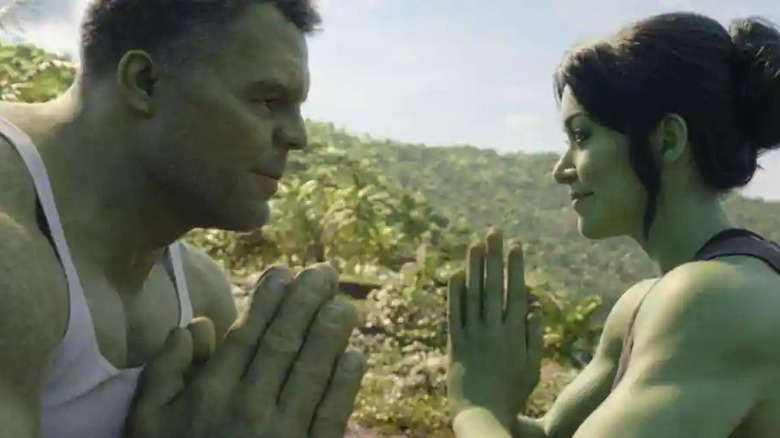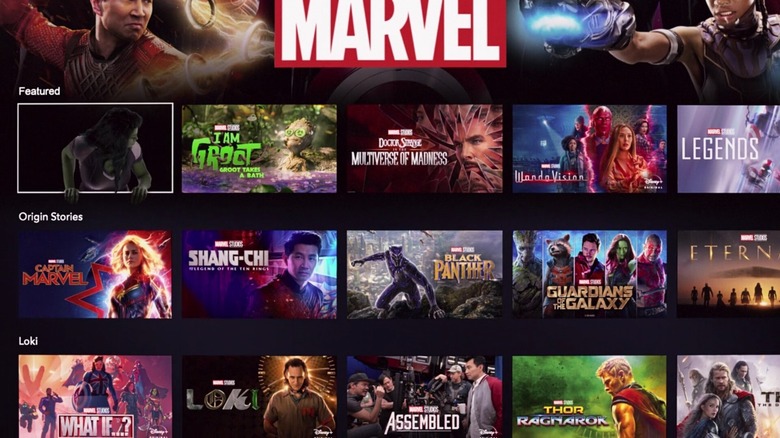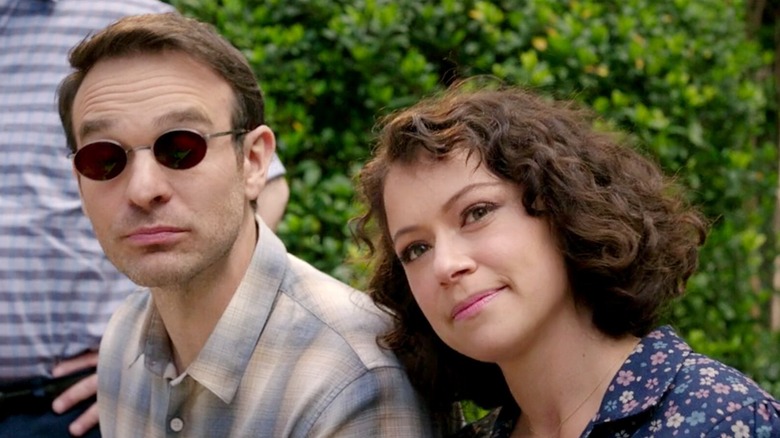She-Hulk Didn't Have A Major Impact On The MCU – And That's Why We Loved It
This post contains spoilers for the entire first season of "She-Hulk: Attorney At Law."
After nine episodes of watching Tatiana Maslany smash villains, fourth walls, and the occasional love interest, "She-Hulk" finale day has finally arrived. Based on everything we've endured in the Marvel Cinematic Universe thus far, that can only mean one thing: it's time to unmask the mysterious Big Bad who will inevitably transform into a Hulk copycat and spend at least half an episode involved in a dramatic CGI battle that destroys lots of property.
I'll be honest, that's usually the part where my eyes glaze over lest I have to engage with a visually incomprehensible fight or worse, stare directly into the latest incarnation of the dreaded sky beam. But Jennifer Walters is much too self-aware to let that happen. As dedicated viewers already know, none of that would've made sense for "She-Hulk: Attorney At Law," a show that has consistently set itself apart from the previous Marvel Disney+ shows. So instead of ending with a groundbreaking revelation that will ripple through the entire MCU, "She-Hulk" just ... ends.
Correction — it ends with a barbecue and a lawsuit. And it's absolutely glorious.
Just Jen!
We didn't always know what we were getting into with "She-Hulk." Thanks to the show's weekly release, it took some time for Jen to truly show her cards. At first, things started on a very familiar track: once, Jen was a totally normal woman who just happened to be related to the Hulk (Mark Ruffalo), and one car crash later, she had a green alter-ego of her own. But that's also where things took a turn. When Bruce tries to give her a big speech about how her life will be forever different, Jen nopes right out of the conversation and decides to return to her everyday life. Powers aside, Jen has absolutely no interest in being at the center of a Marvel blockbuster, so she bids her cousin a very messy farewell and returns to her regular workplace comedy life.
It was never gonna be quite so simple though — Jen still spends the season reconciling her new powers with her old life. But that never really changes the person she is at her core. She still has all her same problems and insecurities, continues her day job as a lawyer, and spends ample time navigating the horrors of the Los Angeles dating scene. Her life is a sitcom before it's anything else, including lots of funny gags and a scene-stealing supporting cast. She certainly isn't living the same life as other MCU heroes. Attending a wedding while trying her damndest not to hulk out? That's a sitcom plot-line. Going to mutant therapy and figuring out the root of her relationship problems? That's practically unheard of in the world of Marvel heroes. Being a Hulk is the inciting obstacle, but just a fraction of her story.
A break from the end of the world
That's not to say that there aren't stakes in "She-Hulk": we get glimpses of the dopey/evil Intelligencia group throughout the series and quickly realize that her brief relationship with Josh was all a ploy to steal her blood. It's not hard to connect the dots of where the blood business is going, but I'll be honest: When we realize what Josh is up to, I was far less concerned about a Hulk copycat than I was about how Jen would react to his ulterior motives. This character-driven story has worked hard to assure we're invested in Jen's journey as a person, and for once, the hero's feelings take precedence over the possibility of a supervillain.
This is an incredibly refreshing situation for the MCU. Usually, the worst-case scenario involves world-ending consequences, and the best-case scenario is life-ending consequences. But "She-Hulk" makes a bid for less interdimensional threats and more class action divorce settlements, twerking in office buildings, and sex with Daredevil. Our concerns aren't how will Jen defeat the anti-Hulk before he levels L.A., but how will she fare under public scrutiny? Will the patriarchy get her down? Will she ever come to terms with people's preference of She-Hulk over Jen? And my god, is there any chance she can maintain a long-distance relationship with Matt Murdock?!
Smashing the fourth wall
For the most part, these Marvel shows have followed the same formula that's been exhausted by the movies. We've seen risk-taking in the form of high school heroism in "Ms. Marvel" and a mental health exploration with "Moon Knight," but even those end up reverting back to that familiar blueprint. One revelation of world-shattering stakes later and the story zooms out to explain away the gods or djinns who have a bigger role to play in events going forward. They take time to lay track for the Next Big Thing and somewhere in that mix, the character drama takes a backseat.
But "She-Hulk would rather smash down Disney+ itself than fall into that same trap — so that's exactly what she does.
Before her series can completely devolve into chaos, She-Hulk strolls into Marvel Studios, demands an audience with K.E.V.I.N., and gets her finale back on track: a simple wrap-up that perfectly suits the refreshing show we've been watching. Instead of an excessive final battle, she grants us some closure for the mistakes of Marvel's past, uses the law to get justice against her villain and invites Daredevil to a family dinner. No universe saving is required.
Whose show is it anyway?
"She-Hulk" may have started off on shaky ground, but unlike other series, it's been consistently easy to watch on a weekly basis. It's a much lighter fare — funnier than other Marvel shows, and never slowing down to bear the weight of extensive lore. It never loses sight of Jen and doesn't even have to sacrifice all the fun Marvel connectivity to accomplish that. This is probably the most cameo-heavy show to date, but no matter how big the guest stars, they never fully pull focus from Jen as the heart of the show.
Even Daredevil himself is subject to fitting into the story on Jen's terms, playing a role in her life rather than altering her story with his own narrative baggage. There's no seismic shift of events to pull Matt back into his own world or grand revelation with Easter eggs from his upcoming journey in "Daredevil: Born Again." The closest that anyone gets to this is seven seconds of Hulk introducing his fully-grown son (??), which is really just an opportunity for Jen to look mildly confused before moving on. Cinematic universe be damned, this never stops being Jen's show.
Like many great sitcoms, "She-Hulk" truly finds its footing towards the end of its debut season, grooving in its niche of comedic hijinks and meta-commentary. With a second season, Jen Walters would just continue to thrive, so it's my sincerest hope that Marvel keeps her on retainer for as long as possible. If we're doubling down on the universe ending stakes of Quantummaia and multiversal madness, then the least they could do is give us the occasional burst of joy that is "She-Hulk: Attorney At Law."
